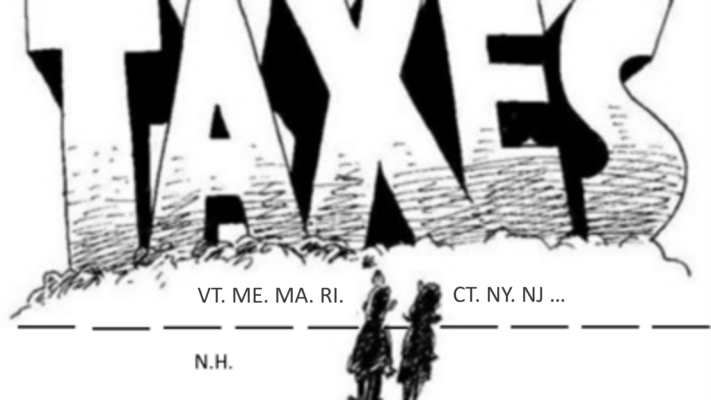Watch for The New Hampshire School Funding Fairness Project. As I listened to their presentation, it became apparent to me that this organization is all about raising state taxes with no guarantees it would lower our property taxes.
Dear Representative Maggiore, Balboni and Senator Altschiller:
I attended a community meeting in Hampton hosted by SAU21 and SAU90. The presentation was given by the New Hampshire School Funding Fairness Project. I was somewhat familiar with school funding, but I’m always open to learning more and listening to people who want to discuss this important subject.
Mr. Tobin expressed his concern about residents paying higher property taxes, which fund a large portion of the school budget. He discussed the state’s obligation to fund public schools in depth. A large portion comes directly from residents through their property taxes. Mr. Tobin also discussed lawsuits filed to shift more of the tax burden to the state.
They also offered a few ideas on how to increase state money going to our local public schools:
1) In 2015 Business taxes were lowered by the legislature. The state could go back to the higher tax rate on businesses, and divert that money to the public schools. In other words, raise business taxes.
2) Support SWEPT taxes which would mean the state would collect the property taxes and redistribute some of those taxes to the receiver towns. In other words, redistribute some of our taxes to other school districts.
3) The State Interest and Dividends taxes will be going away. Instead of eliminating those taxes on residents, continue to tax them, and then send that money to the local schools.
They also mentioned pending legislation like HB1583, which would increase the amount the state pays per student.
Here are my concerns about this organization and what it presented:
1) I heard their plea to lower property taxes for homeowners. I think that is a legitimate concern for those who’ve seen their property taxes continually increase. But those decisions are made at the local level. Fiscal responsibility needs to be a priority. We should first make sure budgets are fiscally responsible first.
Melanson Heath is an accounting firm that was hired by the Windham School District several years ago. They were paid between $15 to $20k to identify accounting practice deficiencies that were present in the district. They helped uncover the misuse of tax dollars from employees having district electronics personally engraved, numerous stale dated checks not accounted for, and unauthorized use of the treasurer’s stamp. The district hired a new superintendent who worked hard to clean up the mess found by the audit and identified more than 130 different items that needed to be addressed.
More money from the state wouldn’t have fixed this problem.
2) Should local businesses shoulder more of the burden as they suggested? This is very concerning, considering local businesses are already paying property taxes and business taxes. After COVID took a strain on our local businesses, is this a good time to raise their taxes?
When the business taxes were lowered in 2015, the state received higher tax revenue. Why would they propose increasing business taxes when lowering them increased tax revenue? That didn’t make sense.
3) Continuing the interest and dividends tax is going to hit retirees and those on fixed incomes, too. Taking our money out of a different pocket still means that they are taxing individuals.
4) I also asked about HB1583. Nothing in the law would require a reduction in property taxes. They mentioned this would be up to local school boards. But this could increase spending and taxes without ever decreasing property taxes.
If I am elected to the North Hampton budget committee, my priority for our schools will always be hiring and retaining good teachers and paraprofessionals. They are the ones who directly impact our students. With declining enrollments, there was no discussion on how to retain families who are seeking alternatives.
One person last night commented that in Massachusetts, they not only have high property taxes, but they also have high state taxes. Would all of this impose additional state taxes that will not have any real impact on property taxes?
I am committed to quality public schools but in a fiscally responsible way. If there are wasteful expenses, let’s identify them and eliminate them. At the same time, we need to support our teachers and staff in order to retain them. Right now, retention is one of the biggest issues facing schools and towns. Sometimes, it’s not about cutting a budget; it’s about redirecting resources to where they will have the biggest impact.
Sometimes it’s not about adding a new tax burden at the state level, it’s about doing the hard work of finding ways to make our public schools better and more efficient. As families leave, who is asking them: WHY?
My questions to you as my current state representatives and senator is this:
1) What are your goals for public education?
2) Do you support raising business taxes, which could result in tax revenue decreasing?
3) Do you support continuing the interest and dividends tax that could impact retirees and those on a fixed income the most?
4) Do you support redirecting our local state property taxes to other school districts through the SWEPT tax?
I’ve been committed to improving public schools in New Hampshire for almost two decades now. Private schools have invited me to sit down and look at ways to improve the quality of education their students have been receiving. That could mean a change to the curriculum or pedagogy. It could mean professional development that supports teachers in the classroom by improving their academic content knowledge. Some of this can be accomplished within existing budgets.
I think it’s important that your constituents know exactly where you stand on this organization and their goals to increase state taxes.
Sincerely,
Ann Marie Banfield
North Hampton, NH
